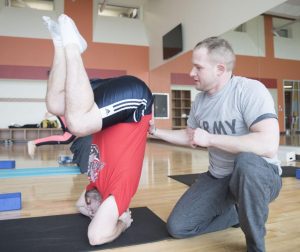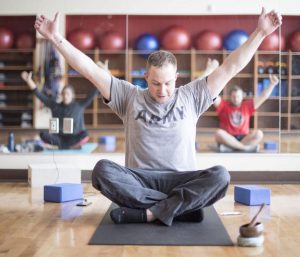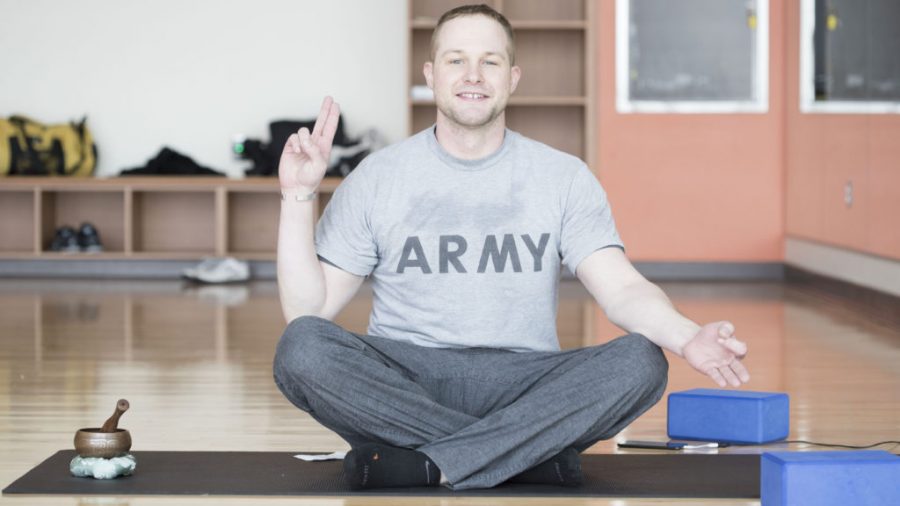It may not be readily apparent but in the sea of students at the University of Utah there are roughly a thousand veterans among us, if not more, who have contributed to the country through military service in varying capacities. One of these veterans is graduate student Keith Blanc, who teaches veteran yoga classes at the Student Life Center.
“I completed my undergrad in communication at the U and now I’m studying public administration in the master’s program.” Blanc said, whose sights are set on non-profit organizations. “In the military I served in the Idaho Army National Guard as a cavalry scout and I deployed for Operation New Dawn in 2010 to 2011.”
As part of what is known as a quick reaction force, Blanc was deployed to Iraq just two months after returning from an LDS mission. “I completed over 100 combat patrols and other missions over there in Iraq and they gave me an Arcom for that, which is an Army Commendation Medal,” he said.
There were, however, some difficult moments during his deployment to which Blanc said, “We lost a couple guys there and we lost a couple guys coming home which I think I could have really prevented one for sure; one of my friends that I should have probably talked to.”
This had a big impact on Blanc, who said, “I think it was just a bad transition coming back because I kind of lost touch with what was familiar with me at home and other things like that, and so I actually, myself, fell into drinking and other problems.”
Telling someone what was on his mind upon returning home helped Blanc overcome feelings of depression and made him realize he needed to take care of his body by tapping into sports like martial arts which he participated in growing up. Blanc is a black belt and initially taught self-defense classes at the Student Life Center incorporating yoga at the end of his sessions.
“I got back into yoga and actually just got a certificate and started taking classes from the University of Utah,” he said. “That’s how I got into yoga. I realized that it helped me out so much just by connecting to my inner-self more.”

The U’s veteran support center accepted Blanc’s offer to volunteer as a yoga instructor for veterans and students of his class have been giving him excellent feedback so far.
“They really like how we concentrate on the breathing exercises,” he said. “It really helps them calm their mind and reach a kind of simple meditation to help build more self-mastery and more mindful awareness. It’s pretty great and we do some exercises as well in the form of poses and some tension exercises, so it’s a little bit of an exercise too, which is great for people.”
One of his students is an Air Force veteran named Andrea Wolfe, who is earning a PhD in clinical psychology and joined the veteran yoga class at the beginning of the semester.
“I actually started doing yoga shortly after I ended active duty and I just found that helped,” she said. “Even though I had a staff job we worked really long hours . . . and some of the physical activity that we did just was really demanding on our body so yoga was a really nice way for me to not only quiet my mind, but also relax my body at the same time.”
In regards to Blanc’s teaching style, Wolfe said, “There are all sorts of different types of yoga and every instructor kind of has their own style but he’s really focused on that mind-body connection and I think that’s unique and keeping that in mind is really important. That’s something that I tell my patients as well.”
In her experience as a clinical psychologist, Wolfe said, “A lot of the times people are trying to avoid emotional distress either by using substances or there’s something really emotionally raw that they just don’t want to or don’t know how to deal with and yoga is really the opposite. It’s really focusing on that tension in your body, in your mind and really connecting with it. That’s one of the reasons why I like it.”
Wolfe has experience in yoga and particularly enjoys sharing the practice with veterans. “It’s usually a small class and I feel like I’m definitely not judged when I’m there,” she said. I don’t really know how to describe it, like I can just be there and not try and be anything else. Whereas some other yoga classes I don’t necessarily feel that way, so I think that makes a better practice for me.”
The veteran yoga class is sponsored by the Veteran Support Center, which is how Wolfe was made aware of the class. The director of the center is Marine Corps veteran Paul Morgan who described it as, “a one-stop shop for student veterans and dependents as well to use their G.I. benefits or vocational rehabilitation benefits or anyone that’s pretty much military affiliated we try to support in one way or another. Things like, be it educational or vocational rehabilitation counseling, we do.”
He added, “Any veteran that comes here that has any kind of question, we try to help them find an answer, give them a resource or — if we don’t have them — find them a resource that they need to succeed here at school. There’s about 1,100 military affiliated veterans that we’re aware of here at the U.”
The state of Utah requested proposals from the U for programs that would benefit veteran students and the Veteran Support Center put forth a three-point proposal. It gave faculty and staff the training to be better equipped in facilitating services and put into effect improved marketing and outreach efforts.

“While we have about 1,100 [veteran students] that we know of, there are those that don’t self-identify; for one reason or another don’t recognize the benefit of doing that,” Morgan said. “So we want to reach those and only about 750 of our 1,100 have actually come to the center for services over the past year so we want to reach out to them too.”
“The third component of [the proposal] was the yoga program which studies have consistently shown that yoga can be beneficial in the treatment of PTSD, anxiety and depression,” he added. “It can resolve and improve levels of sleep quality, less alcohol use, better social interactions, less physical pain and discomfort.”
Several other universities have implemented similar programs and have seen great benefits from it. “We see [yoga] as a way to kind of help improve the overall well being of veterans and help them be more successful in the classroom and if they’re dealing with things like chronic pain or depression, anxiety — perhaps this is a means to help them without medication,” Morgan said.
On his end, Blanc continually devises ways to improve his practice and even came up with his own acronym: R.S.V.P. It stands for finding a Reason to calm your emotions, Space to be quiet and relax, Vibration in your breath and reaching the Point of meditation. He also created a Facebook page called “Mindful Mission Yoga” where he will begin posting short videos and articles on meditation and yoga exercises.
Yoga has been valuable in allowing Blanc to take a pause and get in tune with what his emotions are teaching him and how they inform his thoughts and actions.
“The more I take care of myself and my body just by simple exercises through yoga and simple breathing techniques, the more I want to be healthier and prevent putting in things that I know are going to make me feel worse,” he said. “So I guess I have a greater mind and body connection. . . I’m more aware of how things make me feel and why I want to continue taking better care of myself.”
Blanc said, “[Yoga] was developed by warriors, for warriors to help them awaken their inner powers and teach people how to take care of themselves.”
The veteran yoga class is taught every Monday and Thursday at 2 p.m. in the Arches room at the Student Life Center. Blanc also teaches a yoga class open to all U students every Sunday at 5 p.m.
l.gutierrez@dailyutahchronicle.com



Mark • Apr 17, 2017 at 7:02 pm
Inspiring and amazing! Thanks to Keith and you for sharing!